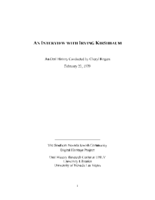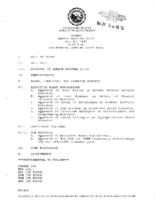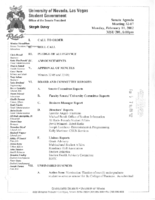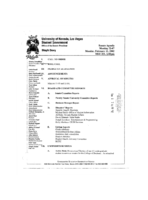Search the Special Collections and Archives Portal
Search Results

Transcript of interview with Gene Greenberg by Barbara Tabach, February 12, 2015
Date
Archival Collection
Description
In 1976, Gene Greenberg decided to accept a job transfer with Donrey Media Group and relocated from Laredo, Texas to Las Vegas. Las Vegas was comfortable fit and for the next 30 years, he primarily worked in television ad sales. He rose to become executive vice president and general manager of KVBC-TV. Significant to Gene’s ties to Las Vegas have been his ties to the Jewish community. This oral history includes reminiscences of connecting with the Jewish community and meeting many of the Jewish leaders through Young Leadership, Jewish Federation, and being on the board for Temple Beth Sholom. The most poignant aspect to his Jewish roots is the survival of both his parents during Holocaust. Both Helen and Abe Greenberg were from Lodz, Poland and interred in concentration camps. Gene is a frequent presenter of their story for his commitment to Holocaust education and as a member of the next generation. Gene and his wife Melanie both spent their childhoods in Kansas City, Missouri and are graduates of the University of Missouri-Kansas City. They married in 1970 and have three children: Sari Mann, Elissa Burda, and Jaron Greenberg.
Text

Transcript of interview with Arby Hambric by Claytee D. White, September 23, 2015
Date
Archival Collection
Description
Arby L. Hambric's book entitled, "To Thee I See: From picking in the fields of Texas to cooking for dignitaries on U.S. Navy ships, a journey I wouldn't change," describes his profound journey from working in the cotton fields as a child to being drafted into the U.S. Navy, before completing high school. During this interview, he recalls the significant achievements of the "Red Tails" and the Tuskegee Airmen. Beginning his 20 year Navy career before military integration, Arby describes the racial tensions that plagued the U.S. Navy in the 1940s, and discusses how he was able to successfully navigate that racist environment for two decades and three war eras. Arby enrolled in San Diego State College after leaving the U.S. Navy. He also worked as maintenance personnel for Sears and Roebuck and started a catering business with his wife. He became a member of the Southern Nevada Enterprise Community, SNEC Board upon moving to Las Vegas, Nevada, after his wife died. With a family legacy he can be proud of, Arby highlights the achievements of his great grandson Taquan Mizzell, a Virginia Cavaliers running back at the University of Virginia. As a Navy veteran, Arby often volunteered his time and resources to help others in need. He recalls driving the sick and elderly back and forth from the Westside community to Valley Hospital or University Medical Center, UMC. He also discusses government enforced road closures and a wall that was built to block Blacks from entering the new downtown. This interview sheds new light on military integration and offers key strategies for overcoming environmental racism. Arby mentions a documentary about the closing of the wall and offers his predictions on the future of the Westside.
Text

James L. Hogan interview, March 11, 1978: transcript
Date
Archival Collection
Description
On March 11, 1978, collector Patty L. Baratti interviewed James Hogan (born April 6th, 1909 in Winton Place, Ohio) at his home in Las Vegas, Nevada. In this interview, Hogan talks about his time working with the telephone company in Arizona and moving to Las Vegas, Nevada. He discusses his time working on grazing rights and cattle ranching in Nevada and how planning went to ensure that farms were able to have land to graze their animals. He speaks about dealing with farmers, corporations, and the government and the frustrations he had to deal with before there were set laws about grazing. He also discusses the change from mainly family farms in Nevada to corporations owning much of the farmland.
Text

Transcript of interview with Marie Horseley by Suzanne Becker, June 13, 2007
Date
Archival Collection
Description
Twenty years after her birth in Utah in 1924, Marie Horseley met and married her husband who was an engineer for the Union Pacific Railroad. They settled in Las Vegas, his home town and soon purchased a home for $9800 in the new John S. Park neighborhood. Sixty years later Marie, twice a widow, remains in the home. Up the street four doors, one of her granddaughters lives with her three children. Marie recalls the new housing development that appealed to railroad workers. The roads were dirt and there were no streetlights, but soon a community blossomed. Marie is a self-described quiet resident; her life was about raising her three daughters and being a member of the LDS church. However, she knew everyone on her street no matter their religious affiliation. Today the businesses are gone. Homes have changed appearances over the years as owners have changed. Ethnic diversity is apparent and the sense of community closeness has slipped away for her. Yet she loves her place there, feels safe and secure. When asked about the ides of John S. Park being designated a historic district, she is not all that wowed by the idea of restrictions that might be included in that. Nevertheless, she has no intention of relocating from the comfort of the place she has called home all these years.
Text

Transcript of interview with Irving Kirshbaum by Cheryl Rogers, February 23, 1979
Date
Archival Collection
Description
Interview with Irving Kirshbaum by Cheryl Rogers on February 23, 1979. In this interview, Kirshbaum discusses the Riviera Hotel where he began working in 1955. He also talks about the landscape of the Las Vegas Strip in the 1950s, and the state of gambling, comps, customer service, and dealer training. The interviewer asks about the treatment of minorities at the Riviera, and in Las Vegas generally, and the effect of corporate ownership on casinos.
Text

William McCullough interview, February 26, 1979: transcript
Date
Archival Collection
Description
On February 26, 1979, collector Pete Wahlquist interviewed William McCullough (born May 9th, 1905 in Kansas City, Missouri) at his home in Boulder City, Nevada. In this interview, Mr. McCullough discusses moving to Nevada and working on the building of Hoover Dam (Boulder Dam). He also speaks about Boulder City during the time of building the dam, as well as the growth he has seen happen in Las Vegas, Nevada.
Text

Interview with Ian Dominic Zabarte, April 4, 2007
Date
Archival Collection
Description
Access note: Audio temporarily sealed. May not quote in any form without written permission from interviewee
Text

Meeting minutes for Consolidated Student Senate University of Nevada, Las Vegas, May 30, 1991
Date
Archival Collection
Description
Text

Meeting minutes for Consolidated Student Senate University of Nevada, Las Vegas, February 11, 2002
Date
Archival Collection
Description
Text

Meeting minutes for Consolidated Student Senate University of Nevada, Las Vegas, February 07, 2002
Date
Archival Collection
Description
Text
